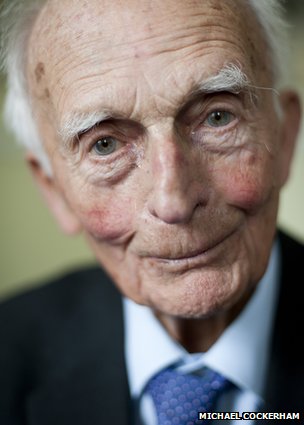Reg Turnill: Veteran BBC aerospace correspondent dies
Reg Turnill spoke to the BBC in 2010 about the Apollo 13 accident
Reg Turnill, the BBC's aerospace correspondent from the beginning of the space age and through the Apollo era, has died aged 97.
After being sent to Moscow to cover the first manned space launch, he regularly reported from Cape Canaveral and Houston on the Apollo Moon missions.
In 1970, he broke the story to the world that Apollo 13 was in trouble.
Mr Turnill's eldest son confirmed the news of his father's death to BBC Radio Kent.
 Turnill contributed to the BBC's coverage of Neil Armstrong's death
Turnill contributed to the BBC's coverage of Neil Armstrong's death
Michael Turnill, 72, said his father was "always very committed to what he was doing" and was still writing stories just eight weeks ago. He added that his mind was still "remarkable" at the age of 97.
Mr Turnill's career began with the Press Association in Fleet Street when he was 15. He stayed with the news agency as a staff reporter until recruited by the BBC in 1956 as assistant industrial correspondent.
In 1958, he was made the BBC's air and space correspondent, with a brief to cover defence.
He interviewed all of the Apollo astronauts and was friends with Wernher von Braun, the architect of Nasa's moon programme.
Speaking to the BBC in 2007, Mr Turnill recalled being first to report that the Apollo 13 mission was in trouble: "It was 10 o'clock Houston time, 4am London time, and I just looked in to a deserted mission control. All was going well, most journalists had gone to bed.
"I was just turning to leave the deserted press centre when I heard the famous words: 'Houston, we've had a problem'. By 5am I'd broken the story. The astronauts were in deadly danger."
Nick Spall, fellow of the British Interplanetary Society, described Mr Turnill as "one of a kind".
Reg Turnill: Reporting the space race
- Born 1915 in Kent
- Started career at the Press Association aged 15
- Joined BBC as assistant industrial correspondent in 1956
- Made aviation and space correspondent in 1958
- In 1969, he reported on the first Moon landing and the maiden flight of Concorde
He said he had spoken to the correspondent recently and said he was "full of his old enthusiasm".
"My key memory was of this father figure on TV in the 1960s, explaining it all in a very British way," said Mr Spall.
"He was the astronaut who never made it to the Moon."
Most recently, Mr Turnill wrote a tribute to the late Neil Armstrong in the October 2012 edition of Astronomy Now magazine and also contributed to the BBC's coverage of the astronaut's death.
He also gave regular public talks on the topic of spaceflight.
In his later years, he lived in Sandgate, Kent. Mr Turnill passed away peacefully in the early hours of this morning at the Pilgrim's Hospice in Ashford, where he had been for the past month.
He is survived by his wife Margaret and their two sons.


 Mince ban 'linked to horse scandal'
Mince ban 'linked to horse scandal' North Korea a 'serious threat' to US
North Korea a 'serious threat' to US We just clicked
We just clicked Oscar excitement
Oscar excitement Defining moments
Defining moments Shut up!
Shut up!
 Click
Click